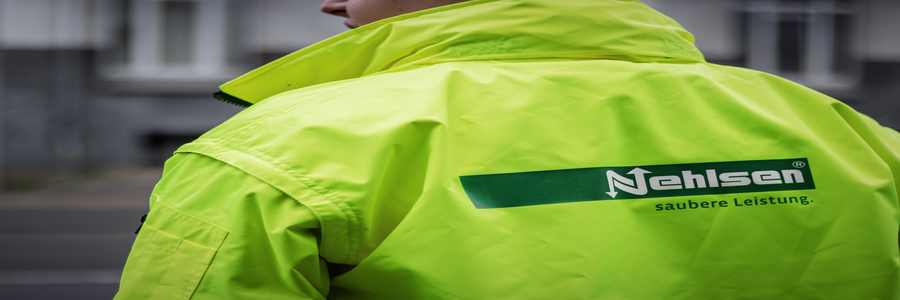- Company
- History

Traditional values and forward thinking
Currently operating in its third generation as a family-run business, Nehlsen has continuously overcome challenges, from its beginning through to the present day, by offering a range of innovations and tailor-made solutions that are delivered by a motivated team of employees.
1923 Foundation
On 10 December 1923, the company was founded by Karl Nehlsen to transport materials (such as sand, pebbles and stones, as well as furniture and other goods) using horse and cart around the northern part of Bremen.
The 1920s
During the 1920’s, waste services in and around Bremen were poor. Therefore, an area in Bremen decided to tender its waste collection service. On 1 December 1928, Nehlsen won the tender and began its role as a waste collector.
The 1930s
By that time, Karl Nehlsen was providing waste collection service for private households, companies and public buildings in part of Bremen. The company dealt with solid and liquid wastes, as well as providing special services such as snow and ice clearing, in this way extending its business activities and areas step by step.
War times
Shortly before the war, the task of waste transportation was made easier when the horse and cart was replaced by the first lorries. However, during the war there were many difficulties in obtaining petrol and spare parts.
After the war
The increasing demands of the waste contracts required Karl Nehlsen to invest in new specialised waste collection vehicles, which was not an easy task around this time. In 1949 his oldest son, Dieter, joined the company and was given the role of developing a logistics branch of the company. Dieter Nehlsen’s progress through the company continued until he took over its management on the 1st April 1953.
The 1970s
In 1973 Nehlsen celebrated its 50th anniversary and it continued to embrace the latest available technology. By this time, the number of fleet vehicles and employees had multiplied several times, and its growth continued as it gained several more waste collection contracts in Lower Saxony and established new operational sites in the close vicinity of Bremen. Managing this growth included establishing a workshop to service the Nehlsen fleet. By now Nehlsen was offering waste management and sewer services to several municipalities and industry. The requirement to handle increasing amounts of waste, and the subsequent constraints by the limited available landfill space, resulted in a waste incinerator being built.
Recycling begins
In the 1970’s public awareness was increasing and recycling now influenced the daily work of all waste management companies. Nehlsen met this challenge by obtaining new vehicles to collect glass and paper separately, allowing it to be recycled. Nehlsen continued to invest in recycling technologies by building waste separating and composting plants. In addition to recycling, Nehlsen was encouraging environmental protection by offering a waste disposal service to ships docking in the ports of Bremen, in order to protect the marine life. To manage the expansions into different aspects of waste management also meant that Nehlsen needed to expand its office space, so in 1988 all employees relocated to new premises.
The 1990’s - The reunification years
In the early 1990’s Nehlsen invested considerable assets in Eastern Germany, establishing new branches between the island Rügen and the Ore mountains, with further business activities in Eastern European countries following soon afterwards. Then Nehlsen became a partner of the Dual System of Germany, which is responsible for the separate collection and recycling of packaging waste from households. In 1995, Nehlsen joined ZENTEK, an association of six medium-sized waste management companies throughout the whole of Germany. This organisation was set up to provide a nationwide service network for the collection of packaging waste. Its alternative carbon neutral approach, i.e. each gram of CO2 produced by the refuse collection vehicles is off-set through climate protection measure elsewhere, is unique and demonstrates Nehlsen’s commitment to environmental protection.
Then in 1995, this remarkable creative period was struck a blow with the sudden and early death of Dieter Nehlsen. As Shareholders, his wife Ilse Nehlsen, along with his nephew Peter Hoffmeyer, took over the business and steered the company through the challenges created by the new 1996 ‘Closed Substance Cycle Waste Management Act’, which by redefining the definition of waste effectively trebled its amount.
The new millennium
On 1 July 2001, the shareholding company of Nehlsen changed to a joint-stock company, with Ilse Nehlsen becoming the chairperson of the board of directors and Peter Hoffmeyer sitting on the board of the executive. The transformation into a joint-stock company was followed by further company reforms that meant formerly independent companies became branches and operational sites. Around this time, Nehlsen expanded its service portfolio by buying the security company elko. In 2006, Peter Hoffmeyer took over the role of the chairman, whilst Ilse Nehlsen, at 80 years of age, became the honorary chairperson.
Operational challenges continue to develop; the Landfill Directive, which came into force in June 2005, prohibited the landfilling of organically unstable waste. Nehlsen had already began developing Mechanical-Biological Treatment processes for MSW toward the end of the 1990’s – pre-empting this change. The resulting technology was incorporated into tailor-made and site-specific process designs for different MBT-plants, which are still operated successfully by Nehlsen today.
Nehlsen further expanded its portfolio by constructing an incineration plant for refuse derived fuels (RDF) in 2005, supplying the generated electricity and steam to a nearby potato processing plant. With this Nehlsen had entered the contracting range of services. This CHP incinerator, the first to supply electricity and steam to the food processing industry, lead to several other plants being built with the same configuration.
Today the company operates in 60 locations in Germany and has international branches in Eastern Europe and Africa. The latest branch was established in Ghana in 2011.